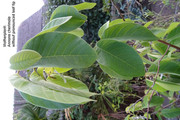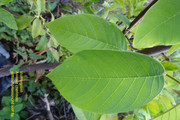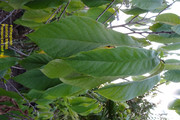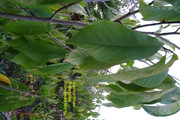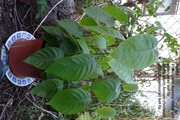@ Guanabanus
Very constructive and interesting - your report on the hybrid you made - thank you for this Information!.Yes absolutely, a polyploid hybrid does not have to be fertile.
Also there are examples which show that polyploidy can help to get fertile plant hybrids. The cereale hybrid Triticiale - a cross between wheat (Triticum aestivum L.) as the female and rye (Secale cereale L.) as the male partner (×Triticosecale or Triticosecale Wittmack) ) the chromosome sets were doubled by using colchicine in the seedlings to obtain fertile offspring. In other words, the doubling of the chromosome sets could only lead to reproductive ability. Triticiale offsprings are usually selsbstungen from Trticicale x Triticiale h itself would actually have the possibility to work with colhizin, but I have not yet worked with it. I would have to read in and study the method, then I could also use it on the Annonaceae.
At this point I like to remember to one of my last posts - to the presentation which takes a summary of
Haldan's rule and the hybridogenic speciation and postzygotic incompatibility.
Haldane (1892-1964) was a British Indian geneticist.https://www.kunz.hhu.de/fileadmin/redaktion/Fakultaeten/Mathematisch-Naturwissenschaftliche_Fakultaet/Biologie/Institute/weitere_und_ehemalige_Dozenten/Prof._Dr._Kunz/07_Haldane_hybridogene_Artbildung.ppt (Sorry that it is written in German language. But the pictures will help to explain.)So in genetics everything is possible. From no result to infertility to the emergence of a separate species with differentiation by developing an incompatibility to backcrossing with the parents. In the plant kingdom the development of incompatible hybrids
At this point I would also like to refer to another interesting report and quote from it: I think some of you, you maybe anyway, I will already know, A. muricata is also mentioned, sorry not A. coriacea )
Polyploidy in Fruit Tree Crops of the Genus Annona (Annonaceae)
https://www.ncbi.nlm.nih.gov/pmc/articles/PMC6378316/https://www.researchgate.net/publication/331019625_Polyploidy_in_Fruit_Tree_Crops_of_the_Genus_Annona_Annonaceae/fulltext/5c6181d692851c48a9ca964d/Polyploidy-in-Fruit-Tree-Crops-of-the-Genus-Annona-Annonaceae.pdf"Genome duplication or polyploidy is one of the main factors of speciation in plants. It is especially frequent in hybrids and very valuable in many crops. (...) Surprisingly, while the hybrid atemoya has been reported as diploid, flow cytometry analysis of a progeny obtained from an interspecific cross between A. cherimola and A. squamosa showed an unusual ploidy variability that was also confirmed karyotype analysis. hile the progeny from intraspecific crosses of A. cherimola showed polyploid genotypes that ranged from 2.5 to 33%, the hybrid atemoyas from the interspecific cross showed 35% of triploids from a total of 186 genotypes analyzed. With the aim of understanding the possible implications of the production of non-reduced gametes, pollen performance, pollen size and frequency distribution of pollen grains was quantified in the progeny of this cross and the parents. A large polymorphism in pollen grain size was found within the interspecific progeny with higher production of unreduced pollen in triploids (38%) than in diploids (29%). Moreover, using PCR amplification of selected microsatellite loci, while 13.7% of the pollen grains from the diploids showed two alleles, 41.28% of the grains from the triploids amplified two alleles and 5.63% showed up to three alleles. This suggests that the larger pollen grains could correspond to diploid and, in a lower frequency, to triploid pollen. Pollen performance was also affected with lower pollen germination in the hybrid triploids than in both diploid parents. The results confirm a higher percentage of polyploids in the interspecific cross, affecting pollen grain size and pollen performance. The occurrence of unreduced gametes in A. cherimola, A. squamosa and their interspecific progeny that may result in abnormalities of ploidy such as the triploids and tetraploids observed in this study, opens an interesting opportunity to study polyploidy in Annonaceae.
(...)
Polyploidy is believed to be a major mechanism of adaptation and speciation, recognized as a major force in evolution (Van de Peer et al., 2017) and very valuable for crop improvement (Udall and Wendel, 2006; Mason, 2016). Polyploidy is more common in plants than in animals. It is estimated that between 30 and 70% of extant flowering plant species are polyploids (...)"
More I will not paste here. The best is to study the complete report by yourself!
Bytheway...to my new hybridizations of this year there is again a small setback. One of the ovaries, which took weeks to show that pollination was successful, has now decided to dry out after some growth. Another one is still in good shape, I hope it stays that way. Last year, such an ovary grew into a strongly deformed fruit, which is another sign of an unusual way of embryo formation. Unfortunately this fruit dried up in centimeter size and still hangs on the tree like a mummy. I have pictures, but I do not want to overload this post!

